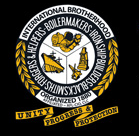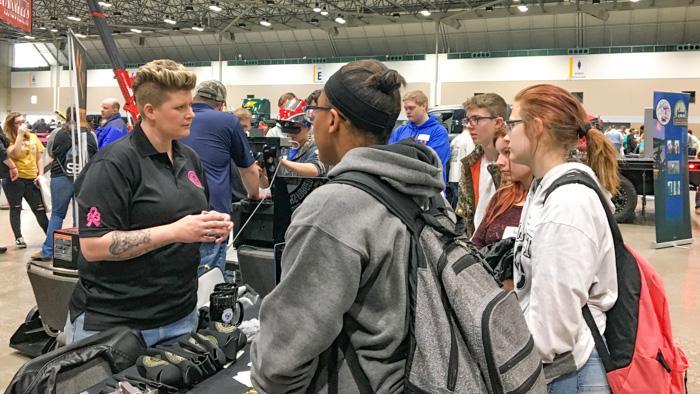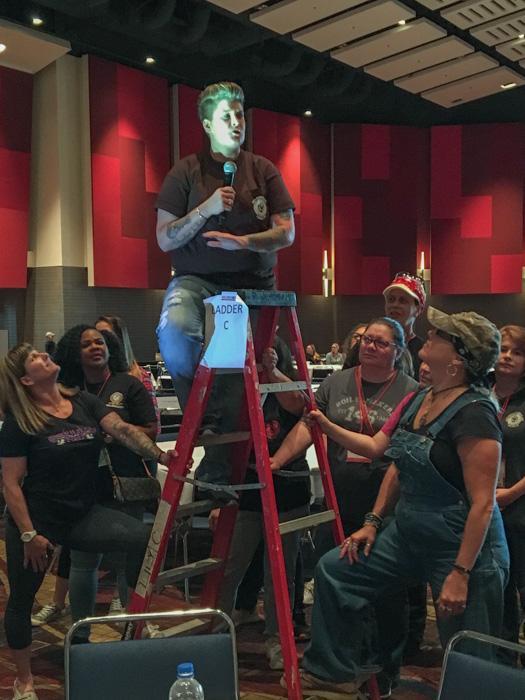IT’S NO SURPRISE that Local 83 dispatcher Tatum Keister turned to the trades for her livelihood when she indentured in 2003. There were only five women in the Kansas City-based local at the time, but that didn’t faze her. She’d grown up with a family who thrived on manual labor.
Keister’s Arkansas upbringing had her roaming the woods and helping her lumberjack uncles with their work. They would cut trees on their land, then sell the logs to local sawmills. The family also hauled around firewood to local residents and businesses on the weekends.
In addition, she had another uncle that worked as a diesel mechanic. She’d haunt his shop. That uncle taught her and her brother to use tools, and in doing so Keister realized she was mechanically inclined.
“I really had five dads instead of just one,” Keister says. “As a kid, I spent all my spare time on firewood.” She’d haul it on the weekends with her uncles and they’d pay her cash—$40 for a day’s work.
She, her brother and her cousins loved the woods and logging so much they’d hike out with a hand saw and cut down small trees. Then, pretending to be logging haulers, they’d drag their load back home on their bikes. Keister said she grew up learning to work hard. It stuck with her.
That work ethic has taken her places. As a young adult, she started college in Sedalia, Missouri. College wasn’t the right path for her so she moved a bit north to Brookfield to work in a welding shop. One night, a supervisor called her over and asked a simple question: “Do you want to make more money?”
After an exuberant “Yes!” he told her about the Boilermakers. He knew a guy in Local 83—Jeff Burns—and he connected the two.
“I didn’t know what a Boilermaker was, but I did want to make more money,” says Keister with a quick smile. She applied and indentured about six months later.
On her first job she was dispatched to Mason City, Iowa, to build two HRSGs. When she arrived, the HRSGs were skeletons. Nothing else. Earl “Short Dog” Rainy, the foreman on her first day, welcomed her before taking her up to the top of what would become a HRSG.
“…she is a talented Boilermaker with a huge heart and truly cares for her brothers, sisters and the organization.”
— Scot Albertson, BM-ST L-83
“He helped me put on my harness, then we walked around,” Keister says. “There was nothing up there but open metal framing. In the end he said he was testing me.”
But walking around an empty frame 10 stories high didn’t bother her one bit. She wasn’t scared. And apparently, Short Dog approved.
Keister went on to embody fearlessness, work ethic and tenacity as a Boilermaker. Well after she became a journeyman, she worked as a rigging foreman on the night shift while pregnant—often pulling 14-hour shifts. She’d arrive home exhausted, park, and be unable to get out of her truck. So she’d fall asleep in the front seat, taking a two-hour nap in the cab before grabbing a few more hours inside and starting all over again.
Keister worked her entire pregnancy, only stopping three weeks before her son, Maverick, was born. And only quitting then because she’d torn her meniscus on the job. Those three weeks are a bit of a blur, she admits, because of the pain caused by the injury. She declined pain meds because she didn’t know how they might affect the baby.
In 2017, after she’d worked 14 years in the field, L-83 BM-ST Scot Albertson asked Keister if she’d be the local’s dispatcher.
“When I chose Tatum as dispatcher, it wasn't so I could be politically correct or trendy,” Albertson says. “It's because she is a talented Boilermaker with a huge heart and truly cares for her brothers, sisters and the organization. I'm proud to call her friend.”
She’s the local’s first female dispatcher—a fact she shrugs at in the same way she always has. Women in the trades are scarce now, but in the early 2000s, they were nearly non-existent. Keister said she’d rarely see a woman on a job site when she started. That never intimidated her.
“I never had it in my head that I wouldn’t fit in,” she says. “It was never even a thought that crossed my mind.”
Keister also advocated for herself. When she’d show up on a job site and the foreman would ask her to watch the hole, she’d say, “I’ll watch it today; but I came here to work, not just watch the hole.”
As with most Boilermakers, Keister had mentors who helped her along the way: L-83’s Steve Myers and Dave Logan, along with Dennis “Dink” Ferris, who, Keister said, is “more of a god-figure.” She said he was a hard-ass and people knew it. “He pushed really hard, but worked really hard, too.” He’d earned a lot of respect over the years.
They still call to see how she’s getting on. “And I call them and ask them to go to work when we’re short, even though they’re retired.”
Transitioning to dispatcher took adjustment. She said that first year dispatching was the loneliest year of her life. She missed the field. She missed being outside. Missed friends she’d worked with.
“When you’re in the field, that’s your family,” Keister said. “And to not have that—it was very hard.”
And then there’s facing outage season as the dispatcher.
“When outage season starts, it’s crazy,” Keister said. “I’d much rather put my hood on in the field and weld.”
But she’s grateful for the new role, and she’s come to realize that even if her tools are her phone and computer now, she’s still part of the local. It includes the men and women in the field as much as the people in the office. “I don’t feel I’m more or less entitled than anyone else because we’re all part of the same team.”
Keister doesn’t sit behind a desk all day. During slow times, she takes Local 83 on the road (along with her cell phone to field calls) and speaks to schools about the union. She’s passionate about recruiting, and it shows. She and Tom Burgess, the local’s apprentice instructor, recently hosted a Boilermaker booth at the trades expo, iBuild, held at the Kansas City Convention Center. Hundreds of high school students stopped by asking about the union, grabbing swag and testing their skills on a virtual reality welding machine. Keister stood for hours talking to the high schoolers, encouraging them to consider the Boilermakers as a career. She simply looks at that as part of the job.
“We’re all a team, and we have to work together,” Keister says. “That’s what union is. That’s why I’m so passionate about recruiting. I don’t want to see the membership keep declining.”


